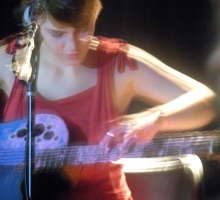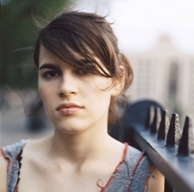 Pat Ragains: Hello, Kaki, and thanks for interviewing with Minor 7th. On your current tour, are you playing
shows with Dan and Jordan?
Pat Ragains: Hello, Kaki, and thanks for interviewing with Minor 7th. On your current tour, are you playing
shows with Dan and Jordan?by Patrick Ragains
Kaki King first gained wide attention as an innovative acoustic instrumentalist, relying heavily
on low-pitched guitar tunings and overhand tapping on her first two albums,
"Everybody Loves You" (2003)
and "Legs to Make Us Longer"
(2004). After these first two releases she began singing more frequently, added electric guitar and
lap steel to her instrumental bag, and began recording and performing with drums, bass, and occasional keyboards.
Rolling Stone magazine placed King in the pantheon of "guitar gods," which, despite her reluctance to be pigeonholed
by such a characterization, has attracted further attention from fans and the music media.
"Junior" is Kaki King's latest album, and continues her recent focus on songs, electric guitar, and small
ensemble. Although this emphasis is relatively new for King, its seeds are present on her early recordings,
as reflected in Alan Fark's Minor 7th review of "Everybody
Loves You," that "her usual M.O. is raucous to the core." After having captured the attention of instrumental guitar
aficionados (a typically loyal base), King grew her audience exponentially by rocking out. This has both broadened her
artistic palette and increased her commercial success. Listeners can look forward to King's continued growth as a
guitarist, songwriter, composer and performer.
 Pat Ragains: Hello, Kaki, and thanks for interviewing with Minor 7th. On your current tour, are you playing
shows with Dan and Jordan?
Pat Ragains: Hello, Kaki, and thanks for interviewing with Minor 7th. On your current tour, are you playing
shows with Dan and Jordan?
Kaki King: Yes, Dan Brantigan (multi-instrumentalist, primarily on bass) and Jordan Perlson (drums) -- they're my band.
We've been on tour for quite some time now.
PR: When you play live, what do your audiences like the most? Does their response surprise you?
KK: Well, I've got five records now, so we play a bit from each and we definitely take in some of the more rocking
material, because that's a lot louder. So that kind of gets people pretty excited, and then I take a solo break and
play the old favorites, the guitar stuff, and people like that. You know, everyone's different -- everyone has a
different favorite song. We get crazy requests -- people yelling out different songs and whatnot. So, you know, I
think it's kind of this big epic moment at the end, where we're really rocking out, and the drummer does a solo,
and then we end the show. And then I get back on stage and play a looped number on my lap steel, and get out in the
crowd, and dance with people. So it's all just a big hodgepodge of different flavors.
PR: Do you go out with a set list or do you vary it quite a bit?
KK: We did for a while. It's difficult, because, going from one guitar tuning to the next, and if I'm having to
radically tune from one thing to the next song, it's kind of hard. But now I have a guitar tech who can help me.
She tunes all my guitars for me and we have an extra couple of guitars with us on the road, so we have a lot more
flexibility. So yeah, we try to change up the set list more and more, each time we play.
PR: Do your songs change when you play them live?
 KK: Well, it depends on which song, you know. Personnel-wise, it's three people, whereas on the record it might
have been 40 tracks. We never try to literally recreate what we ever did or what I ever did in the studio (when
we play) live. So, you know, you kind of have a lot more dynamics, I suppose. There's a lot more highs and lows.
I think that'd be the number one change.
KK: Well, it depends on which song, you know. Personnel-wise, it's three people, whereas on the record it might
have been 40 tracks. We never try to literally recreate what we ever did or what I ever did in the studio (when
we play) live. So, you know, you kind of have a lot more dynamics, I suppose. There's a lot more highs and lows.
I think that'd be the number one change.
PR: Talk about your new CD, Junior. What are some of your favorite tracks on that?
KK: Let's see, I was listening the other day and it's still such a hodgepodge. There's so much different shit
on there. I really like "My nerves that committed suicide," for personal reasons (laughs), and the song "Death
head," I think is a great song, and a song like "Sunnyside" is a very personal song that needed to be written
and played, and I think the "Hoopers of Hudspeth," which we don't play live, I think has a very strange and eerie
chord progression that I sometimes just play to myself. But, it's funny, I listen to it sometimes, "Communist
friends." I actually don't listen to the record -- I just think about it. We were doing radio the other day and
they were putting on all sorts of different tracks from the record, and Dan and I were there going, "Goddamn,
this is so weird, listening to this -- we haven't listened to it in ages."
PR: When you pick up a guitar at home, what do you play?
KK: What do you mean?
 PR: What kind of music do you play?
PR: What kind of music do you play?
KK: I don't know -- guitar.
PR: Do you play your own music, do you play covers, and do you have a practice regimen?
KK: I don't have a practice regimen. If I'm playing for pleasure, which mostly I do, I'll get in one of my
familiar tunings and kind of mess around and improvise stuff. And if I'm in working, writing, creative mode,
usually changing the tuning helps me write something new, or I'll find a specific riff and sort of go with it,
you know, I'll just play until I find a riff that I really like. I don't know, I kind of took a lesson or page
out of the book of Mark Knopfler, who said, a lot of times he'll just sit there and play, you know, just make up
stuff, play all night, then get up the next day, or the next time he picks up his guitar, and whatever he can
remember, whatever has stuck with him in his couple hours of wandering - that's what he knows is gonna be good
in the song. And so that's how I usually end up writing songs, is sticking with what my mind and my fingers have
latched on to.
PR: What music has influenced you the most?
KK: Oh, I don't really talk about influences -- it's just silly. But I listen to a lot of classical music and I
don't necessarily infiltrate it into my music too much, but I listen to it quite a bit. Like, my favorite thing
to listen to will be... to come home and put on some Erik Satie, some piano music, some Chopin -- kind of mellow out
to that. And then I quite like a lot of current things that are happening, depending on what we're doing and where
I am. I like quite a bit of Brazilian music right now. And then there's also, you know, the old standards, from
when I was a teenager, like I've been going back to listen to Stereolab on my iPod -- they're such a good band.
So, that really changes from day to day.
 PR: Do you use any special recording techniques for your vocals? Some of them sound doubled.
PR: Do you use any special recording techniques for your vocals? Some of them sound doubled.
KK: Yeah, they're all doubled. I think on this record, we pretty much doubled everything. We wanted the sound,
so everything got doubled.
PR: Do you have anything else to say about the recording process - anything special you do?
KK: Well, the beauty of working with (producer) Malcom Burn is that he's so not precious about sound. I mean,
he is when he mixes, but he doesn't fucking bring out 12 microphones and put each one on the guitars and
amplifiers just to see which one is the best. I mean, he just knows what works. And he doesn't even get precious
about, "Ohh, the bugs here, the little clicks to delete here...," He's like, "This is making a record. This can't
be performing surgery. Let's just throw up a mic and let's play music. Let's not worry so much about every single
sound, you know, like every single wave form." And when he records... I mean, the drums sound phenomenal on this
record -- I think they sound incredible. He used, maybe, three mics and maybe a fourth on the drums. He doesn't
believe in taking apart the drum set, sonically and putting it back together - it just doesn't make sense to him.
So, when we were playing, we all played together, and when there's guitar and drums and the bass sounds, they're
all -- we were all just standing in a room playing together -- everything bleeding into everyone else's mics. And
he just believes in that, he's an old school, analog kind of guy.
PR: Yeah, that's interesting, it's not the way things are done most often nowadays, but you definitely get people
interacting.
 KK: Oh, yeah, for sure! You also get sound waves in there, you also get microphones and feedback in there. You get
something that's played to a drum mic turning up on your guitar track that, all of a sudden, sounds cool!
KK: Oh, yeah, for sure! You also get sound waves in there, you also get microphones and feedback in there. You get
something that's played to a drum mic turning up on your guitar track that, all of a sudden, sounds cool!
PR: What do you want to do musically, that you haven't done already?
KK: I'd like to do more composing for films. I've scored a couple of documentaries; I've scored a feature film
("Into the Wild"). I've worked on some major Hollywood productions. I think I'd like to get into composition a
little bit more, in terms of being able to write for other instruments, and lead that kind of charge. So, I know
how to produce and send off a home studio version of a nice track for a film score or something like that, but I'd
like to take it a step further.
PR: Have you given guitar or songwriting workshops?
KK: I think I have. There have been a couple of times when the venue was attached to a music school, and prior to
you coming to the venue, you give a little master class, and you stand around and talk to people and whatnot. But
no, I've never really given classes. I mean, I've done it, like, twice.
PR: So, it's kind of like a question and answer session before the performance?
KK: Exactly that.
PR: Is that something that appeals to you, that you think you might be interested in, in the future?
 KK: I don't know. I don't think, right now, I'm that good of a teacher, 'cause I don't know what the hell I'm
really doing. It's really hard for me to explain in specific musical terms, like if I was having to tell someone
over the phone, what I'm doing on guitar, it's a bit iffy for me, because I'm really going by a lot of gut
instincts and it's hard to take your instincts and give it to someone else's gut. So, I don't know that I'd be
really great at it. Also, part of me feels like, just the way that I learned was that I can't bloody be bothered
with learning other people's techniques and their rules and ideas, you know, I just can't be bothered, I'm just
going to do it my own way. I kind of feel the best way to create new music is to not be bothered by other people's
ideas and to come up with your own. So, as far as a general aesthetic or a general manifesto, what you will, I
sometimes don't want people to really focus too much on learning how to play, you know, like, "Oh, I wish I could
play like you, I wish I could play this song." I'm like, "Don't bother with that -- play your own songs. You'll be
far better."
KK: I don't know. I don't think, right now, I'm that good of a teacher, 'cause I don't know what the hell I'm
really doing. It's really hard for me to explain in specific musical terms, like if I was having to tell someone
over the phone, what I'm doing on guitar, it's a bit iffy for me, because I'm really going by a lot of gut
instincts and it's hard to take your instincts and give it to someone else's gut. So, I don't know that I'd be
really great at it. Also, part of me feels like, just the way that I learned was that I can't bloody be bothered
with learning other people's techniques and their rules and ideas, you know, I just can't be bothered, I'm just
going to do it my own way. I kind of feel the best way to create new music is to not be bothered by other people's
ideas and to come up with your own. So, as far as a general aesthetic or a general manifesto, what you will, I
sometimes don't want people to really focus too much on learning how to play, you know, like, "Oh, I wish I could
play like you, I wish I could play this song." I'm like, "Don't bother with that -- play your own songs. You'll be
far better."
PR: What advice can you give to aspiring musicians? You've already mentioned that it's a good idea for people to
just follow their own muse.
KK: Follow your muse and have very low expectations of what music's gonna provide you as far as an income source,
or a career, or fame. Focus on what it's gonna provide you, like the food of the soul. This is getting into some
corny territory, but it's really true. Like, what is it gonna provide you in terms of how it's gonna improve your
life and feed your heart and whether you're playing in your bedroom or you're playing to 2,000 people, each
performance is gonna mean something to you. At the end of the day, it's gonna be yours alone. I guess, maybe,
don't listen to other people. Just do what you really, really enjoy. And if you want to improve your technique,
then find something hard to do, that you can't do, then do it slowly a million times, then it's easier.
© 2010 Patrick Ragains
Here's a partial discography for Kaki King: